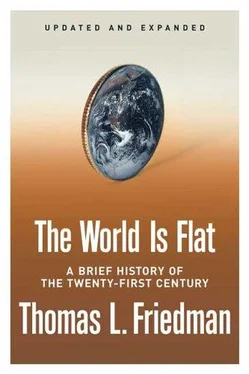And having gotten his dose of humiliation this way, bin Laden and his emulators have learned to give it right back in the same coin. Want to understand why the Islamo-Leninists behead Americans in Iraq and Saudi Arabia and then distribute pictures on the Internet with the bloody head of the body resting on the headless corpse? It is because there is no more humiliating form of execution than chopping off someone's head. It is a way of showing utter contempt for that person and his or her physical being. It is no accident that the groups in Iraq who beheaded Americans dressed them first in the same orange jumpsuits that al-Qaeda prisoners in Guantanamo Bay are forced to wear. They had to learn about those jumpsuits either over the Internet or satellite TV. But it amazes me that in the middle of the Iraq war they were able to have the exact same jumpsuits made in Iraq to dress their prisoners in. You humiliate me, I humiliate you. And what do you suppose terrorist leader Abu Musab al-Zarqawi said in his audiotape released on September 11, 2004, the third anniversary of 9/11? He said, “The holy warriors made the international coalition taste humiliation... lessons from which they are still burning.” The tape was titled “Where Is the Honor?”
As I said, however, this frustration and humiliation is not confined to the Islamist fringes. The reason why the Islamo-Leninists have become the most energized and pronounced opponents of globalization/ Americanization and the biggest threat to the flattening of the world today is not simply their extraordinary violence, but also because they enjoy some passive support around the Arab-Muslim world.
In part, this is because most governments in the Arab-Muslim world have refused to take on these radicals in a war of ideas. While Arab regimes have been very active in jailing their Islamo-Leninists when they can find and arrest them, they have been very passive in countering them with a modern, progressive interpretation of Islam. This is because almost all of these Arab-Muslim leaders are illegitimate themselves. Having come to power by force, they have no credibility as carriers of a moderate, progressive Islam, and they always feel vulnerable to hard-line Muslim preachers, who denounce them for not being good Muslims. So instead of taking on the Muslim radicals, the Arab regimes either throw them in jail or try to buy them off. This leaves a terrible spiritual and political void.
But the other reason for the passive support that the Islamo-Leninists enjoy-and the fact that they are able to raise so much money through charities and mosques in the Arab-Muslim world-is that too many good decent people there feel the same frustration and tinge of humiliation that many of their most enraged youth do. And there is a certain respect for the way these violent youth have been ready to stand up to the world and to their own leaders and defend the honor of their civilization. When I visited Qatar a few months after 9/11, a friend of mine there-a sweet, thoughtful, liberal person who works for the Qatari government— confided to me something in a whisper that was deeply troubling to him: “My eleven-year-old son thinks bin Laden is a good man.”
Most middle-class Arabs and Muslims, I am convinced, were not celebrating the death of three thousand innocent Americans on 9/11. I know my Arab and Muslim friends were not. But many Arabs and Muslims were celebrating the idea of putting a fist in America's face— and they were quietly applauding the men who did it. They were happy to see someone humiliating the people and the country that they felt was humiliating them and supporting what they saw as injustice in their world-whether it is America's backing of Arab kings and dictators who export oil to it or America's backing of Israel whether it does the right things or the wrong things.
Most American blacks, I am sure, had little doubt that O. J. Simpson murdered his ex-wife, but they applauded his acquittal as a stick in the eye of the Los Angeles Police Department and a justice system that they saw as consistently humiliating and unfair to them. Humiliation does that to people. Bin Laden is to the Arab masses what O.J. was to many American blacks-the stick they poke in the eye of an “unfair” America and their own leaders. I once interviewed Dyab Abou Jahjah, often called the Malcolm X of Belgium's alienated Moroccan youth. I asked him what he and his friends thought when they saw the World Trade Center being smashed. He said, “I think if we are honest with ourselves, most of the Muslims all over the world felt that... America got hit in the face and that cannot be bad. I don't want to make an intellectual answer for that. I'll give it very simply. America was kicking our butts for fifty years. And really badly. Supporting the bullies in the region, whether it is Israel or our own regimes, [America] is giving us not only a bleeding nose, but breaking a lot of our necks.”
Just as America's economic depression in the 1920s and 1930s made many normal, intelligent, thinking Americans passive or active supporters of communism, so the humiliating economic, military, and emotional depression of the Arab-Muslim world has made too many normal, intelligent, and thinking Arabs and Muslims passive supporters of bin Ladenism.
Former Kuwaiti minister of information Dr. Sa'd Bin Tefla, a journalist, wrote an essay in the London Arabic daily Al-Sharq Al-Awsat on the third anniversary of September 11 titled “We Are All Bin Laden,” which went right to this point. He asked why it is that Muslim scholars and clerics eagerly supported fatwas condemning Salman Rushdie to death for writing an allegedly blasphemous novel, The Satanic Verses, that wove in themes about the Prophet Muhammad, but to this day no Muslim cleric has issued a fatwa condemning Osama bin Laden for murdering three thousand innocent civilians. After the fatwa was declared against Salman Rushdie, Muslims staged protests against the book at British embassies all over the Islamic world and burned Salman Rushdie dolls along with copies of his book. Nine people were killed in an anti-Rushdie protest in Pakistan.
“Religious legal rulings were disseminated one after another banning Salman Rushdie's book and calling for him to be killed,” Bin Tefla wrote. “Iran earmarked a reward of $ 1 million for whoever would implement Imam Khomeini's fatwa and kill Salman Rushdie.” And bin Laden? Nothing-no condemnation. “Despite the fact that bin Laden murdered thousands of innocents in the name of our religion and despite the damage that he has caused to Muslims everywhere, and especially to innocent Muslims in the West, whose life is much better than the life of Muslims in Islamic lands, to this date not a single fatwa has been issued calling for the killing of bin Laden, on the pretext that bin Laden still proclaims 'there is no God other than Allah,'” Tefla wrote. Worse, he added, Arab and Muslim satellite television channels have “competed amongst themselves in broadcasting [bin Laden's] sermons and fatwas, instead of preventing their dissemination as they did in the case of Rushdie's book... With our equivocal stance on bin Laden, we from the very start left the world with the impression that we are all bin Laden.”
Germany was humiliated after World War I, but it had the modern economic foundations to produce a state response to that humiliation—in the form of the Third Reich. The Arab world, by contrast, could not produce a state response to its humiliation. Instead, it has rattled the world stage in the last fifty years with two larger-than-life figures, rather than states, noted political theorist Yaron Ezrahi: One was the Saudi oil minister Ahmed Zaki Yamani, and the other was Osama bin Laden. Each achieved global notoriety, each briefly held the world in his palm-one by using oil as a weapon and the other by using the most unconventional suicide violence imaginable. Each gave a temporary “high” to the Arab-Muslim world, a feeling that it was exercising power on the world stage. But bin Laden and Yamani were only the illusions of power, noted Ezrahi: The Saudi oil weapon is economic power without productivity, and bin Laden's terrorism weapon is military force without a real army, state, economy, and engine of innovation to support it.
Читать дальше












